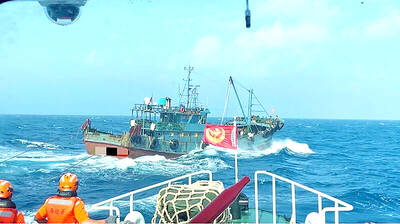As the spread of COVID-19 appears to be slowing in Taiwan, the Central Epidemic Command Center (CECC) is considering easing restrictions over indoor activities, such as allowing gatherings of up to 250 people, Minister of Health and Welfare Chen Shih-chung (陳時中), who heads the center, said yesterday.
Such an easing would allow wedding banquets with 30 tables, with eight people per table, and each table 1.5m apart, he said.
The center is discussing with information security departments how to protect personal data if diners are required to register their names when visiting restaurants, he said.

Photo: CNA
It is also considering issuing a safety mark for restaurants that follow the center’s recommended disease prevention guidelines, he said.
Asked about loosening border controls or disease prevention regulations, Chen said many decisions made since the COVID-19 outbreak had been painful ones, as the center had to find a balance between humanitarian considerations and the public interest.
These included allowing a Taiwanese who returned home to break his 14-day home quarantine so he could see his father for the last time, not letting Taiwanese stranded in Wuhan, China, return to Taiwan on their own, and an abrupt announcement that all travelers arriving from Europe would be placed under mandatory quarantine, as the center had to make quick decisions as the pandemic evolved, he said.
Chen said he is grateful for the public’s support and cooperation, which has helped Taiwan stand out in disease prevention efforts, but people will have to continue following personal protective measures to keep this up.
The center yesterday reported no new cases of COVID-19, marking the fourth consecutive day with no new confirmed infections and the 29th consecutive day with no new domestic cases.
A total of 368 patients have been removed from isolation after recovery.
However, the center confirmed one more death, bringing the total number of deaths to seven.
The patient, case No. 197, was a man in his 40s who traveled with his wife to the US from March 8 to 18, exhibited symptoms, including a fever, on March 19, and reported for testing on March 21.
The man and his wife, case No. 202, tested positive for COVID-19 on March 24 and were hospitalized.
The man did not have chronic diseases and was not suffering from pneumonia when he was admitted to the hospital, but his condition worsened rapidly and he was transferred to an intensive care unit on March 28 when he experienced difficulty breathing, CECC advisory specialist panel convener Chang Shan-chwen (張上淳) said.
The man, who had been on extracorporeal membrane oxygenation support for more than a month, developed complications, including septic shock and multiple organ failure, and passed away on Sunday, Chang said.
His wife, also in her 40s, experienced the same symptoms and tested positive on the same day as her husband, so they might have been infected by the same type of virus, but she was removed from isolation after testing negative for a third time on April 10 and was discharged from the hospital on April 11, Chang said.
As the man was middle-aged and did not have chronic diseases, Chang said he might have suffered a cytokine storm — a severe immune reaction in which an excessive release of proinflammatory cytokines results in the body attacking its own cells and tissues rather than just fighting off the virus.

MILITARY BOOST: The procurement was planned after Washington recommended that Taiwan increase its stock of air defense missiles, a defense official said yesterday Taiwan is planning to order an additional four PAC-3 MSE systems and up to 500 missiles in response to an increasing number of missile sites on China’s east coast, a defense official said yesterday. The official, who spoke on condition of anonymity, said that the proposed order would be placed using the defense procurement special budget, adding that about NT$1 trillion (US$32,88 billion) has been allocated for the budget. The proposed acquisition would include launchers, missiles, and a lower tier air and missile defense radar system, they said The procurement was planned after the US military recommended that Taiwan increase

POLITICAL AGENDA: Beijing’s cross-strait Mid-Autumn Festival events are part of a ‘cultural united front’ aimed at promoting unification with Taiwan, academics said Local authorities in China have been inviting Taiwanese to participate in cross-strait Mid-Autumn Festival celebrations centered around ideals of “family and nation,” a move Taiwanese academics said politicizes the holiday to promote the idea of “one family” across the Taiwan Strait. Sources said that China’s Fujian Provincial Government is organizing about 20 cross-strait-themed events in cities including Quanzhou, Nanping, Sanming and Zhangzhou. In Zhangzhou, a festival scheduled for Wednesday is to showcase Minnan-language songs and budaixi (布袋戲) glove puppetry to highlight cultural similarities between Taiwan and the region. Elsewhere, Jiangsu Province is hosting more than 10 similar celebrations in Taizhou, Changzhou, Suzhou,

COGNITIVE WARFARE: Chinese fishing boats transmitting fake identification signals are meant to test Taiwan’s responses to different kinds of perceived incursions, a report said Chinese vessels are transmitting fake signals in Taiwan’s waters as a form of cognitive warfare, testing Taipei’s responses to various types of incursions, a report by the Institute for the Study of War said on Friday. Several Chinese fishing vessels transmitted fake automatic identification system (AIS) signals in Taiwan’s waters last month, with one mimicking a Russian warship and another impersonating a Chinese law enforcement vessel, the report said. Citing data from Starboard Maritime Intelligence, the report said that throughout August and last month, the Chinese fishing boat Minshiyu 06718 (閩獅漁06718) sailed through the Taiwan Strait while intermittently transmitting its own AIS

CHINESE INFILTRATION: Medical logistics is a lifeline during wartime and the reported CCP links of a major logistics company present a national security threat, an expert said The government would bolster its security check system to prevent China from infiltrating the nation’s medical cold chain, a national security official said yesterday. The official, who wished to stay anonymous, made the remarks after the Chinese-language magazine Mirror Media (鏡周刊) reported that Pharma Logistics (嘉里醫藥物流) is in charge of the medical logistics of about half of the nation’s major hospitals, including National Taiwan University Hospital and Taipei Veterans General Hospital. The company’s parent, Kerry TJ Logistics Co (嘉里大榮物流), is associated with the National Committee of the Chinese People’s Political Consultative Conference (CPPCC) and the Chinese People’s Liberation Army (PLA), the